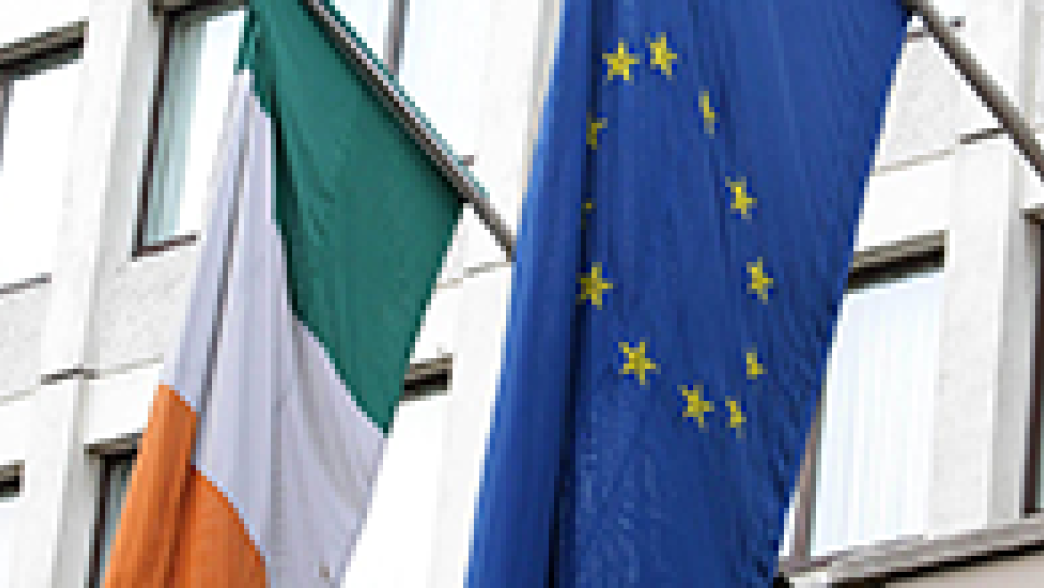
How will Brexit affect UK–Ireland relations?
The UK and Ireland joined the European Economic Community at the same time in 1973, and their current economic and political relationship largely depended on their membership of the EU.
The UK’s decision to leave the EU raised questions about a number of areas, including:
- the Northern Ireland peace process, underpinned by the Good Friday Agreement (or Belfast Agreement)
- how to operate the border between Northern Ireland and the Republic of Ireland for people and goods
- preserving co-operation between the North and the Republic, and between the Republic and the UK.
Some of these issues have now been resolved through the Ireland/Northern Ireland protocol, which creates special arrangements for Northern Ireland to avoid a hard border on the island of Ireland. However, there is ongoing disagreement between the UK and the EU over the operation and future of the protocol.
What does the Protocol say about the Good Friday Agreement / Belfast Agreement?
The Good Friday Agreement / Belfast Agreement, signed in 1998, brought an end to sectarian conflict and established power-sharing in Northern Ireland. The agreement assumes EU membership for both the UK and Ireland and makes provisions for the UK and Irish governments to co-operate on EU matters.
The Ireland/Northern Ireland protocol reaffirms the commitment of the UK and Irish governments to the protection of the 1998 agreement. In particular, it recognises the right of the people of Northern Ireland to assert their Irish citizenship and access the rights of EU citizens, as per the agreement. It also commits to avoid a hard border, including any physical infrastructure or checks and controls on the island of Ireland.
Article 2 of the protocol commits the UK to ensure that there is “no diminution of rights, safeguards or equality of opportunity” as set out in the Good Friday Agreement / Belfast Agreement, and to continue to facilitate the work of Commissions on Human Rights and Equality. A specialised committee on the implementation of the protocol has been given responsibility for considering any issues raised by such commissions on the enforcement of this article.
The protocol also states that its implementation and application must maintain the conditions necessary for continued North–South co-operation, and this will be subject to review by the Joint Committee – the UK–EU body responsible for overseeing the Withdrawal Agreement.
What will happen to EU PEACE funding after Brexit?
The EU PEACE funding is intended to promote social and economic cohesion between communities in Northern Ireland and border counties in the Republic of Ireland.
The EU has provided funding to facilitate the peace process in Northern Ireland since 1989; the first specific PEACE funding programme was approved in 1995 and has continued in some form until the present day.
The EU and the UK have reached an agreement on the continued financing of PEACE programme funding.
How will Brexit affect people crossing the border between Northern Ireland and the Republic of Ireland?
The Ireland/Northern Ireland protocol contains a commitment to maintain the Common Travel Area (CTA), which has been in place for most of the period since the establishment of the Irish Free State in 1922. The CTA allows free movement of British and Irish citizens between the UK, Ireland, the Channel Islands and the Isle of Man and provides access to various government services in each country.
Ireland will continue to allow freedom of movement for citizens of the other 26 EU member states. In the absence of a land border on the island of Ireland, the UK envisages using inland controls, through the access to labour markets and social security, to enforce immigration policy without requiring checks on people crossing the Irish border.[1]
How will Brexit affect goods crossing the border between Northern Ireland and the Republic of Ireland?
The Ireland/Northern Ireland protocol ensures that there will be no checks on goods crossing the border between Northern Ireland and the Republic of Ireland. Northern Ireland will be required to align with the EU in certain areas like product requirements, agriculture rules, and state aid. The EU customs code will apply in respect of Northern Ireland, effectively moving the EU’s external customs border into the Irish Sea. As such, additional checks on goods moving from Great Britain to Northern Ireland are likely to be required.
The protocol also outlines arrangements for the Northern Ireland institutions to periodically give consent to the continued operation of the arrangements for trade, customs and regulatory alignment. If the Northern Ireland assembly votes not to consent, then the arrangements will cease to apply after two years; this reintroduces the possibility of border controls on the island of Ireland. The first vote will take place four years after the end of the transition period.
The Northern Ireland protocol covers the movement of goods on the island of Ireland; any agreement of services will be dealt with the UK–EU future relationship negotiations.
How is Brexit viewed from Northern Ireland?
All five main political parties in Northern Ireland are opposed to the Withdrawal Agreement, albeit for different reasons.
Nationalist parties Sinn Féin and the Social Democratic and Labour Party and cross-community party Alliance are all opposed to Brexit – although all supported Theresa May’s backstop as a way of avoiding a no-deal Brexit.
Unionist parties the Democratic Unionist Party and Ulster Unionist Party had previously supported the UK leaving the EU, but are opposed to the Withdrawal Agreement on the basis that the Northern Ireland protocol creates additional barriers between Northern Ireland and Great Britain.
In January 2020, the Northern Ireland assembly voted unanimously to withhold consent – as required by the Sewel convention – for the Withdrawal Agreement Bill.
-
HM Government, Northern Ireland and Ireland - position paper, 16 August 2017, www.gov.uk/government/publications/northern-ireland-and-ireland-a-position-paper
- Topic
- Brexit